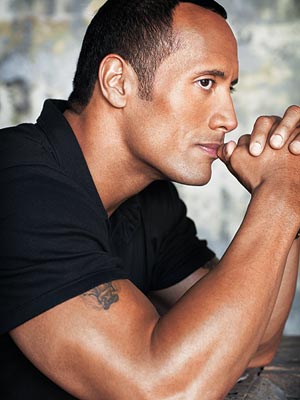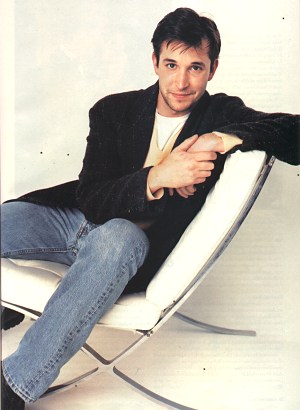Therefore, in order to completely counteract the residual gravitational pull of discussing my mom, my childhood, suicide, self-destructive behavior and other emotionally draining topics, I'm letting the pendulum swing in the opposite direction. With Spring teasing my id, periodic sunshine revving my circadian rhythms and mid-life jamming the signals of my hormonal cycle, I have no choice but to give in to natural groove and go with it.
As a result, I've put together a Do List, more specifically, MY DO LIST.
I don't mean to insult your intelligence or knowledge of pop culture, but on the off chance that you're squinting your eyes, shaking your head, pursing your lips and wondering what the hell a Do List is, allow me to explain.
A Do List is a list of celebrities who you are, in agreement with your partner, allowed "to do" one time, should the opportunity ever arise. The pure beauty is that the event does not count as infidelity. In fact, your partner doesn't even have to know about it. It's like having ten, one use, anonymous E tickets for sex with the top ten celebrities of your choice. Are you with me? Good. Let's move on.
FAQ's:
1) Do they have to be celebrities?
Yes. If they were just that old unscratched itch or smoldering ember from years passed, there would be too much emotional tug. The opportune coupling might then become a threat to the partnership. We don't want that. Stop your whining right now and say it with me, "We don't want that." Good.
2) How many may I have on my list?
That's between you and your sweetie but personally, I'd put the max at 10.
3) I only get to do them once?
Yeah. That's the rule. This is meant to be pure carnal bliss while avoiding emotional attachments
4) What are the chances you'd actually ever be in a situation where you might be able to take advantage of your options?
Gosh. I'd have to say skinnier than slim to none. I guess that's really the point. But it's good fun and excellent fantasy fodder, don't you think?
OK, here goes. In no particular order I give you:
- Ken Watanabe: I adored him in "The Last Samurai". Muscle-ridden, reflective, philosophical, committed, pent-up, angry, loyal, imperfect. Oh, yeah. That could work.
 |
| Ken, just give me a chance and I can wipe that serious look off your face for a night. |
- Dwayne Johnson, a.k.a., The Rock: OK. Knock it off. I saw you rolling your eyes. No judging allowed. I like him. He's funny, self-deprecating, hunky, and I could just imagine the feeling of being wrapped up in those steely arms. Yes. That is me you see melting into abandon...
 |
| Lord, hear my prayer. |
- Ryan Kwanten: He cannot possibly be as stupid as his Jason character on True Blood. And besides that, he doesn't need to say a word. In fact, he can just lie there in bed and I'll do all the work for both of us. Happy to oblige.
 |
| Like I said, he can just lie there and I'll do all the work. |
- Ed Burns: I guess what I like about Ed is that he seems pretty smart, fairly cute if slightly goofy-looking, not overly concerned about his appearance, and is waving a brave, unapologetic good-bye to his hairline. I appreciate that in a guy. Do you suppose that means he'd try harder? I'm willing to find out.

How about it, Ed. Are you like Avis? - Isaiah Mustafa--The ex-footballer, Old Spice dude: I know, I know. You're right. He's a sort of a cliched and obvious choice. He seems to have a good sense of humor underneath those biceps. And admit it--he's beautiful without being pretty. Good Christ, look at the dude. What's not to love?
| I love a man who can handle a horse and smells like a man, man. |
- Noah Wylie of ER and Donnie Darko fame (to name a few): He's just got that sweet, brown-eyed, take-me-home-and-have-your-way-with-me, puppy dog look that makes me want to snuggle right up to him and spend the night satisfying our mutual beastly urges.
 |
| Hey, there puppy. May I scratch you here or there? You can scratch me anywhere... |
- John Corbett: Remember him? He played the philosophical, ex-felon DJ on Northern Exposure and Carrie's boyfriend in Sex and the City. He seems like another guy who doesn't seem overly concerned about his looks. I can imagine having a beer with him, slipping between the sheets, enjoying a romp and a few laughs at the same time. No one gets hurt and we both go home happy.
 |
| Adorable. Who could say no when all you have to do is nod your head yes? |
No doubt you've noticed I still have 3 spots open. True. I figure I've got lots of time to put things together so I'm not rushing myself. The truth is, there aren't LOADS of men out there I find overwhelmingly panty-dropping appealing. Is it possible middle-agedness is catching up with me? Or perhaps--just maybe--I'm saving those places for a woman or two or three or... Oh, pshaw. Who could blame me?
This is probably unnecessary, but I feel the need to explain a few blatant omissions:
- Johnny Depp: He was at one time in my line-up but he's gone overboard with that lame pirate look. Lately, he appears to be outrageously filthy and very likely germ-infested, neither quality falling into the category of sexy.
- Brad Pitt, Rob Lowe, Jude Law, and the rest of their ilk: Their major issue is they're too pretty. The last thing I want to be thinking about is how much prettier my date is than I. Total buzz-kill.
- George Clooney: I dunno. He just doesn't do it for me. I do think he'd be fun to hang out with. Maybe he could be the older brother I never had.
- Ashton Kutcher: I should really like him--tall, dark, handsome, but... ::shoulder shrug:: he already has his cougar. He doesn't need me. All I can say is I'm just not that into him. But Demi, girl, you knock yourself out!
- Tom Cruise: Just kidding! Really, I wasn't at all serious. Were you?
If you're wondering if I'm supposed to rank them, the answer is yes. I just can't bring myself to put one over the other. That being said, the older guys have an edge on the younger ones. No doubt about it. Generally speaking, the older they get, the smarter they get, and therefore, the better they get. At least that's the hope.
You're upset. You're not comfortable with this. You're saying I've objectified these men.
You're right. And your point is...?
Be real. On some base level I do this because, as human as I am, I'm still an animal. I'm indulging my animal side right now. Deal with it. Run with it. Snarl at it. Grab it by its scuff. Mount it. Hump it.
Ah. You feel better now, don't you?
Once you're done forgiving me for my base indiscretion, I invite you to give it some thought. I'd like to know who makes YOUR DO LIST. Please feel free to respond in the comment section below. Your humanistic/animalistic identity needn't be exposed. You are invited to be as anonymous as your sense of decency requires. But really... my animus is aching to know.



